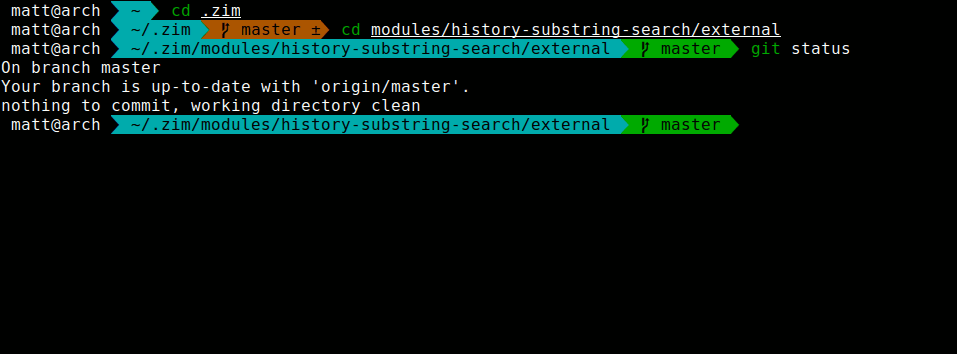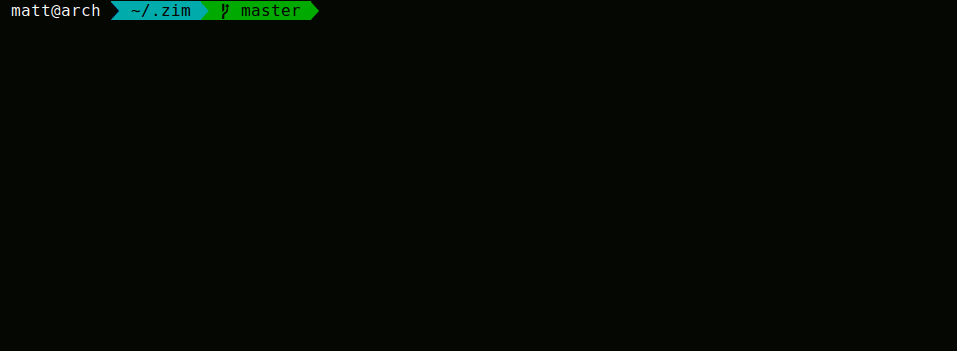We want to recompile zimfw.zsh if it changes. ZIM_HOME is not required to be set beforehand anymore, so let's give the users the variable info back. |
||
|---|---|---|
| .github | ||
| src | ||
| .gitignore | ||
| LICENSE.md | ||
| Makefile | ||
| README.md | ||
| zimfw.zsh | ||
Zsh IMproved FrameWork
What is Zim?
Zim is a Zsh configuration framework with blazing speed and modular extensions.
Zim is very easy to customize, and comes with a rich set of modules and features without compromising on speed or functionality!
What does Zim offer?
If you're here, it means you want to see the cool shit Zim can do. Check out the available modules!
Below is a brief showcase of Zim's features.
Speed
For a speed comparison between Zim and other frameworks, see this wiki entry.
Themes
To preview some of the available themes, check the themes wiki page.
Fish-shell history navigation
Syntax highlighting
And much more!
Zim has many modules! Enable as many or as few as you'd like.
Installation
Installing Zim is easy:
-
With curl:
curl -fsSL https://raw.githubusercontent.com/zimfw/install/develop/install.zsh | zsh -
With wget:
wget -nv -O - https://raw.githubusercontent.com/zimfw/install/develop/install.zsh | zsh
Open a new terminal and you're done! Enjoy your Zsh IMproved! Take some time to
read about the available modules and tweak your .zshrc file.
If you have a different shell framework installed (like oh-my-zsh or prezto), uninstall those first to prevent conflicts.
Manual installation
-
Set Zsh as the default shell:
chsh -s =zsh -
Start a Zsh shell
zsh -
Copy https://raw.githubusercontent.com/zimfw/zimfw/develop/zimfw.zsh to
${ZDOTDIR:-${HOME}}/.zim/zimfw.zsh. -
Add the lines in the following templates to the respective dot files in the
${ZDOTDIR:-${HOME}}directory: -
Install the modules defined in
.zimrcand build the staticinit.zshscript:source ${ZDOTDIR:-${HOME}}/.zim/zimfw.zsh install
Usage
zmodule
Add zmodule calls to your .zimrc file to define the modules to be loaded.
The modules are loaded in the same order they are defined. Add:
zmodule <url> [-n|--name <module_name>] [options]
where <url> is the required repository URL or path. The following formats
are equivalent: name, zimfw/name, https://github.com/zimfw/name.git.
By default, the module name is the last component in the <url>. Use the
-n|--name <module_name> option to set a custom module name.
Repository options
-b|--branch<branch_name>: Use specified branch when installing and updating the module. Overrides the tag option. Default:master.-t|--tag<tag_name>: Use specified tag when installing and updating the module. Overrides the branch option.-z|--frozen: Don't install or update the module.
Startup options
-f|--fpath<path>: Add specified path tofpath. The path is relative to the module root directory. Default:functions, if the subdirectory exists.-a|--autoload<function_name>: Autoload specified function. Default: all valid names inside all the module specifiedfpathpaths.-s|--source<file_path>: Source specified file. The file path is relative to the module root directory. Default: the file with largest size matching{init.zsh|module_name.{zsh|plugin.zsh|zsh-theme|sh}}, if any exists.-d|--disabled: Don't use or clean the module.
zimfw
To install new defined modules, run:
zimfw install
To update your modules, run:
zimfw update
To upgrade Zim, run:
zimfw upgrade
For more information about the zimfw tool, run zimfw with no parameters.
Uninstalling
The best way to remove Zim is to manually delete ~/.zim, ~/.zimrc, and
remove the initialization lines from your ~/.zshrc and ~/.zlogin.


